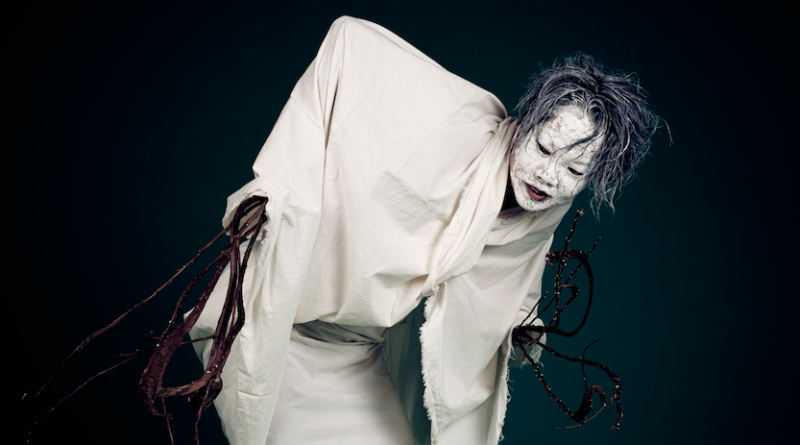INTERVIEW: ‘Queer Butoh 2020’ is ready to celebrate Pride Month
Photo: Mee Ae performs in Swoon. Photo courtesy of Jari Poulin / Provided by Michelle Tabnick PR with permission.
The artistic form known as butoh is a dance and performance style that developed in the post-war years in Japan, and Vangeline Theater / New York Butoh Institute, under the direction of choreographer Vangeline, has been keeping the tradition alive in New York City with interesting, creative performances that are both respectful of the past and looking ahead to the future.
Their latest project — one that is informed by both the coronavirus pandemic and Pride Month — is Queer Butoh 2020 (DIGITAL), in collaboration with Howl Arts. The virtual programming features the choreographic work of Mee Ae, Davey Mitchell, Dustin Maxwell and Scoop Slone, and performances via Vimeo are set for June 22-28.
Ae, who graduated from Bard College in 2000 and is now based in Ithaca, New York, will present a piece called Swoon. Maxwell is a movement-based artist who lives in New York City, according to press notes, and he will present In a dark forest partly illuminated: portal. Scoop has worked with everyone from Portland Opera to HEREArts, and the artist’s Butoh contribution is called Fragments. Finally, Mitchell, who has presented at Brooklyn Academy of Music and P.S. 122, will present the nine-minute Diary of a Mad Swan.
Recently Hollywood Soapbox exchanged emails with Vangeline about Queer Butoh 2020 (DIGITAL). Here the 2015 winner of Gibney Dance’s Beth Silverman-Yam Social Action Award opens up about Pride Month, the queer origins of the art form and this new collaboration with four butoh artists. Questions and answers have been slightly edited for style.
What can audience members expect from Queer Butoh 2020 (DIGITAL)?
Because the show is going digital due to COVID-19 this year, we are hoping to reach out to a wider audience than our regular live audience. LGBTQQ peeps from all over the world have been reaching out to us saying how excited they are to have access to the work of these local artists.
How did you select these three artists to collaborate with? Was there an application process, or did you have previous partnerships with them?
Two of the featured artists are Queer Butoh alumni and longtime collaborators (Mee Ae and Davey Mitchell). They both performed at the first Queer Butoh in 2016, so it was nice to have the opportunity to bring them back and share their work with a wider audience. The other two performers (Dustin Maxwell and Scoop Slone) have been taking butoh classes with the New York Butoh Institute for a few years and were selected based on their video submissions. Both are very talented performers with impressive credentials in their respective fields.
How difficult is it to present this art form virtually?
Butoh is both very cinematic and difficult to capture on film. On the one hand, so much of the intercorporeal exchange is lost on video, but on the other hand, film, as a medium, offers a range of opportunities that a live performance may not. Dustin Maxwell’s brilliant surrealist short film is a great illustration of this type of possibility. Either way, for better for worse, the circumstances forced to take a risk.
Is there an LGBTQ history to butoh? How about Kinjiki (Forbidden Colors)?
Kinjiki was the first butoh piece (1959) and depicted a homoerotic encounter between a younger and older man (Tatsumi Hijikata and Yoshito Ohno). The piece was so shocking that Hijikata was thrown out of the Japan dance association. So one could say that queerness is found at the roots of the art form.
Why is it important to be a teacher of butoh and pass on this art form to others?
Like other corporeal art forms and dance forms, butoh is passed from body to body through the lineage. Without the transmission of information, precious knowledge risks being forever lost. For me, anyhow, teaching is like an arrow we send into the future. We are not quite sure where it will land, but we have to keep trying.
By John Soltes / Publisher / John@HollywoodSoapbox.com
Queer Butoh 2020 (DIGITAL) will be presented June 22-28 on Vimeo, courtesy of Vangeline / New York Butoh Institute and Howl Arts. Click here for more information.

